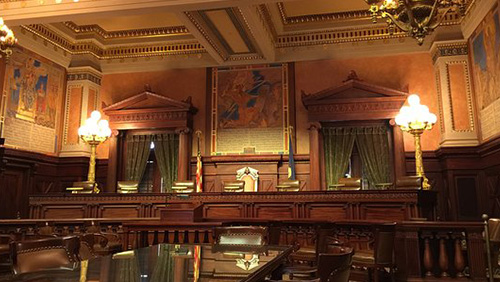In 2017, Pennsylvania introduced new laws that saw the state’s gambling activity expanded to include, among other things, online casinos and sportsbooks. Everything looked good on paper at first, until some people started reading the fine print. Language in the legislation appeared to show a certain lack of equity across the gambling industry and some casinos took offense. They launched a lawsuit that made its way to the Supreme Court of Pennsylvania, which has now issued its decision.
 In the gambling expansion package was a provision that would take 0.5% of all slot revenue from all venues and put it into a Casino Marketing and Capital Development Account. That was fancy language that, when dissected, translated into taking from the rich and giving to the poor. The money was distributed to the weakest casinos in the state for those to use for marketing and property improvement expenses.
In the gambling expansion package was a provision that would take 0.5% of all slot revenue from all venues and put it into a Casino Marketing and Capital Development Account. That was fancy language that, when dissected, translated into taking from the rich and giving to the poor. The money was distributed to the weakest casinos in the state for those to use for marketing and property improvement expenses.
Sands Bethlehem was the first to realize that something was off-kilter and sued Pennsylvania. The venue rightfully argued that this, in essence, was the same as the better-performing venues being forced to give a portion of their profits to the weaker properties.
The Supreme Court has agreed, asserting that the move violated state and federal laws. According to Supreme Court Justice Thomas Saylor, “Act 42 establishes a system specifically designed so that the taxpayers who pay the least into the CMCD Account are the most likely to receive a mandatory distribution from that account (and the less they pay, the more they receive), and vice versa.”
As such, that portion of the legislation is illegal and the state will have to reimburse the casinos that contributed to the fund a total of $21 million. Pennsylvania was also ordered to stop collecting the funds.
This was one of three lawsuits that have been brought against Pennsylvania as a result of the gambling expansion bill. Penn National, which owns Hollywood Casino in the state, sued over a plan that would allow mini-casinos, arguing that smaller companies, such as Mount Airy, were favored by the plan. Penn eventually dropped the lawsuit, but not before deciding to launch two mini-casinos of its own to protect its assets.
Another lawsuit is currently underway that involves a handful of casinos and the Pennsylvania Department of Revenue. That lawsuit targets the state’s online lottery, which the casinos argue are too similar to slot machine play. The casinos argue that this similarity makes the instant win games illegal because the lottery doesn’t have an interactive gaming license.
Fortunately for Pennsylvania, the $10-million fee for online gambling licenses exists. This will help it cover some of the costs of the continuous litigation.